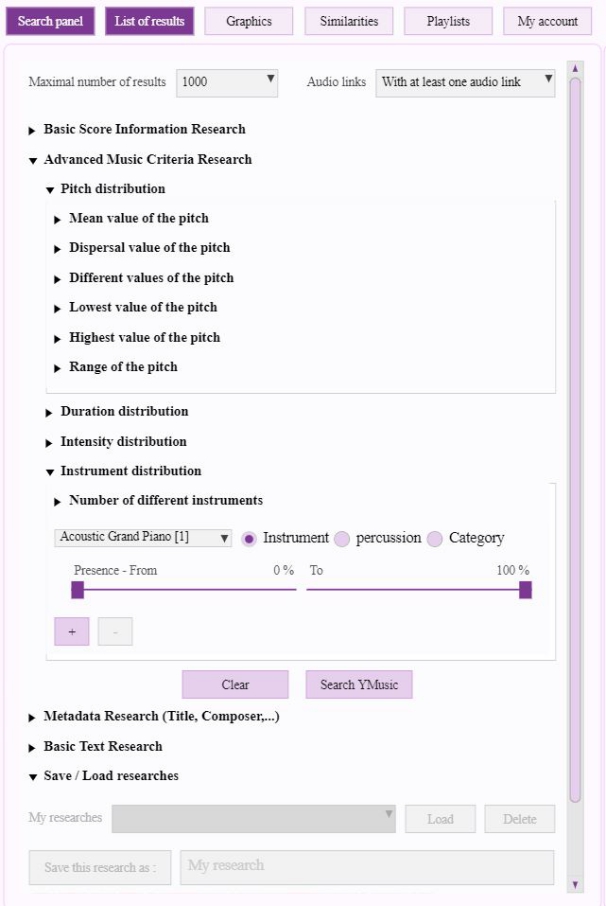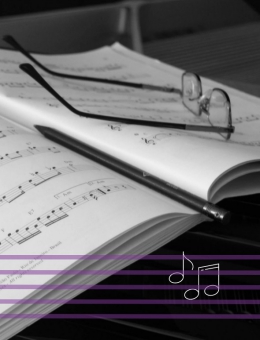


December 31th, 2020
Dear Music Researcher,
Dear Music Lover,
We want to assist you in achieving your (re)search targets. Choosing the YMusic search engine to assist you in your tasks, what can you obtain?
Musical data that you can find without us, online or offline
There are data that you can find very easily online, at least for an important part of contemporary music: metadata. Titles, composers’ and performers’ names, and genres belong to this type of data.
There are also data that you can find quite conveniently by doing a serious search. Where? In a library. There, you can find musicology books which present musical analysis of works written by numerous composers.
And, of course, on the internet or in libraries, you can get thesis, consult various general websites and use tools which give you raw data about music, tools like beats per minute counters or chord finders.
What is missing?
At the academic level: comprehensive tools to analyse music beyond genres and periods.
In the music business: real musical metadata for a large body of music, data like the number of musical notes in a long classical piece of music or the variations of tempo inside such a piece.
Which recurring problems do music researchers face?
Today, we listen to more music in one month than our peers during the 1700s in their entire existence. However, online music services require their listeners to have a precise target in mind when they make a search query: a title, a name. Due to this limitation of language, there is a gap between our expectations and what we get, at the musical level.
This is even more obvious in a general search engine. If we write "What are similar pieces of music to The Rite of Spring by Stravinsky?" (or: your preferred piece of music!) in the search box, the results include links towards the piece of music, the work of the composer, etc. However, no piece similar to The Rite of Spring appears; more precisely: no direct link to a piece that is musically similar is provided for immediate listening.
It means that we do not get any direct and immediate answer to our initial question. General search engines and online music streaming services are not conceived to analyze questions musically and to establish musical relationships between different pieces of music.
Finally, at the level of the music industry, generally speaking, the cultural data provided by the media are quickly outdated. For example, this is the case for weekly popular hits charts, which, in addition to providing no information on the musical content related to music itself, change every week.
How the YMusic search engine helps music researchers to get insightful information
However, now, there is the YMusic search engine, which is offering specific criteria to select music based on the content of the music itself, rather than on cultural (meta)data.
Actually, the style of data provided by YMusic, for example the average variation of tempo inside a musical composition is not a simple data. It is already a small segment of information, because the algorithm of YMusic, to provide it, has to take several points of reference inside this composition, while a simple data is an isolated element.
It is therefore by providing the researcher with complex and innovative data that YMusic stands out. With YMusic, you can get information related to complex musical parameters, like the range of the pitch for a specific piece of music (or an ensemble of titles) or its harmonics.
What can you do with this information?
Each music (re)searcher has his/her own targets, in various contexts and we providing guidelines for research or publishing is not our mission.
Our role is rather to help researchers to renew the manner in which they can see and assemble musical elements to get a deeper understanding of music, exploiting all new information into their specific framework and transforming it into knowledge.
We wish you great hours and interesting finds with YMusic.
The YMusic search engine team
Written by Françoise Delsaux, Marketing designer and product designer
Arpege Music Software Development
hello @ music-search-engine.info
http://www.arpegemusic.com
Arpege's mission is to develop sheet music composition and notation software, in an environment now completed by the YMusic search engine, an intelligent technology which provides musicians with quantified insights, via music visualizations and similarities graphs.
WELCOME TO MUSIC CONTENT RESEARCHERS
______________________________________________________________________________

We support
music
research
development
YMUSIC
SEARCH
ENGINE
BLOG